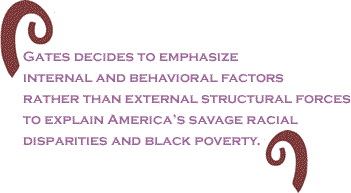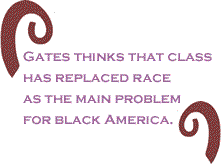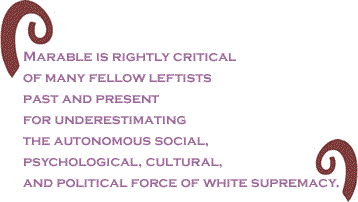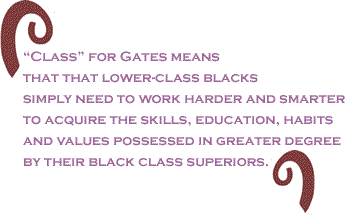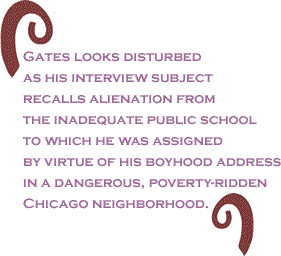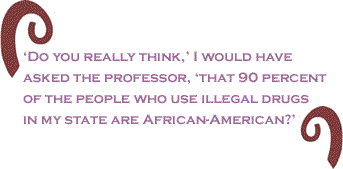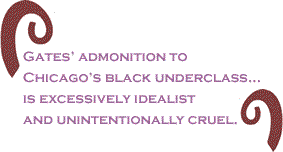
|
|||||||||||||||||||||
|
“Skip” Gates is at it again: warning us about the dangerous, self-destructive choices being made by the United States’ poorest black citizens. I am referring to Dr. Henry Louis “Skip” Gates, who describes himself as “center left” and holds three prestigious academic titles, all at Harvard: W.E.B. DuBois Professor of Humanities, Chair of the Afro-American Studies Department, and Director of the W.E.B. DuBois Institute for Afro-American Research. Henry Louis “Skip” Gates: “Class Over Race” Last February, Gates marked Black History Month by narrating an ambitious, four-part, and British-directed Public Broadcasting System television series titled “America Beyond the Color Line.” “America Beyond” is meant to provide a provocative new take on race, class, and black experience in the contemporary United States. Some viewers, however, may have recognized Gates’ core thesis in this documentary from an earlier Gates-PBS series broadcast in February 1998. As in that earlier video essay, Gates focuses in “America Beyond” on class differences within the American black community of “the post-Civil Rights era.” In both productions, Gates is struck by “an irony” first brought to his attention by the renowned African-American sociologist William Julius Wilson, a fellow “center-left” colleague at Harvard. “Since 1968,” Gates told the Chicago Tribune as “America Beyond” aired, “we have two classes within black America, the biggest middle-class in history and the percentage of black children living at or beneath the poverty level is almost exactly the same as it was the day Dr. [Martin Luther] King [Jr.] was killed. That’s bizarre when you think about it.” (Steve Johnson, “Behind Gates: How the Harvard Scholar is Using His ‘Color-Line’ PBS as a Wake-Up Call,” Chicago Tribune, February 3, 2004, section 5, page 1.)
Blacks in the aftermath of the civil rights movement are experiencing both “the best of times and the worst of times,” Gates thinks. The “best” times are reserved for the black middle and upper classes, whose sizes, wealth, and power are currently unprecedented in their scale. The “worst” times belong to the large number of impoverished or near-impoverished African-Americans who have been unable to walk through the doors of racial opportunity that were opened by the great civil rights victories. Failing to cash in on the advantages afforded by the end of legal segregation and the enactment of affirmative action (among other changes), many of these unfortunate blacks have been left behind in jobless, crime-ridden ghettoes that have been fled by the more successful elements of the black populace. Like Wilson some years ago, Gates thinks that class has replaced race as the main problem for black America. The civil rights revolution, he appears to think, largely resolved the great American dilemma of race, but left unresolved the deeper, more intractable problem of class. Manning Marable: Class And Race But what exactly does Gates mean by “class?” How does he explain the fracturing of black America into “two nations?” And how true is it that race has faded relative to class in explaining the special difficulties faced by the nation’s poorest African-Americans? For serious black scholars of unqualified left persuasion like Manning Marable, class is part of a bold and radical interpretive and political framework that identifies multiple, interrelated structures of inequality and calls for the democratic re-structuring of dominant American institutions. According to Marable, “the racialized inequality that African-Americans have brutally experienced and deeply feel is only one important dimension of the larger problem of inequality that is structured across the entire American social order” (Marable, The Great Wells of Democracy: The Meaning of Race in American Life [NY, 2002], p. 7). It is part of what Marable calls “interlocking systems of prejudice, power, and white heterosexual male privilege in which the vast majority of the population has been defined outside the acceptable boundaries of the mainstream.” Among these multiple “interlocking systems,” Marable includes “the hierarchy of class: the unequal distribution of the bulk of all private property, productive resources, factories, banks, and financial institutions into the hands of a small minority of the population, with the great majority forced to live and exist only by its labor power; the development of an ideology of class privilege that masquerades by calling itself ‘merit’; and, increasingly the monopolization and exploitation of global resources and transnational corporations to manufacture and preserve the privileges of class” (Marable, p. 11).
As Marable knows, consistent with a record of black scholarship and thought reaching back to T. Thomas Fortune, W.E.B. DuBois, Claude McKay, and Oliver Cox and up to Angela Davis and Adolph Reed (among many others), class inequality has provided no small part of the context for the construction of racial inequality and racism in America and the world. “Those who control or dominate hierarchies, whether by ownership of the means of production or by domination of the state,” Marable notes, “have a vested interest in manufacturing and reproducing categories of difference,” including race among other such groupings. Marable is a democratic socialist opponent of class inequality who thinks “we will never dismantle” racism in America “unless we are also willing to address the transformation of the American social structure and the full democratization of our political and economic institutions” (Marable, pp. 11-12). Like DuBois, Martable’s broad left contextualization of racism does not lead him to the conclusion that class/classism has transcended or displaced race/racism as the basic issue for African-Americans. Marable is rightly critical of many fellow leftists past and present for underestimating the autonomous social, psychological, cultural, and political force of white supremacy. He chides left class-reductionists for too-readily assuming that progressive social-democratic institutional change towards the resolution of class inequality will quickly or easily yield the overcoming of white racism (Marable, pp. 52-55). At the same time, he argues that blacks face an imposing inter-connected array of special, racially specific obstacles that have interacted with class and other inequalities to create a virulent and living legacy and system of “structural racism” that has provided a foundational barrier to America’s democratic pretensions since the beginning of the republic. This “structural racism” inflicts its harshest pain on Gates’ “underclass,” but it also and still harms more affluent African-Americans, who possess much less wealth and power than their white counterparts and make up a considerably smaller portion of their own race group than do affluent whites. In a society understood accurately, on Marable’s terms, to be fragmented at one and the same time by interlocking and mutually reciprocal divisions of race and class, there is nothing “bizarre” or “ironic” about the accelerated class fracturing of black America in the wake of a strictly qualified civil rights revolution that extended a certain measure of “whiteness” to a small section of the African-American populace. “No Excuse” for Blacks Not “Running MIT”
This is not how Gates uses “class” to understand the situation of America’s millions of persistently impoverished and marginalized African-Americans in “America Beyond.” Accepting the dominant privilege-friendly and Euro-bourgeois notion that success, empowerment, and freedom are essentially available to all who exhibit proper individual initiative and “personal responsibility,” he thinks that African-Americans at the bottom of the steep US socioeconomic pyramid are largely to blame for their own misery. “Class” for Gates means that that lower-class blacks simply need to work harder and smarter to acquire the skills, education, habits and values possessed in greater degree by their black class superiors, including the imperialist figurehead Colin Powell, featured as an example of what blacks can accomplish when they work hard, study, save and behave decently. The main “class problem” that Gates portrays in “America Beyond” is that poor blacks just don’t have any…well, class. “Unless there is a moral revolution and a revolution in attitude among our people, unless [poor blacks] decide to stay in school, learn the ABCs, not to get pregnant when you’re 16, not to run drugs, not to sell drugs…we’re doomed to have a relatively small black middle class and huge underclass and never the twain shall meet. The only way we can succeed in society,” Gates told the Tribune, “is mastering the ABCs, staying in school, working hard, deferred gratification. What’s happened to these values?,” asks Gates. “My father always said, and it’s true, if we studied calculus like we studied basketball, we’d be running MIT. It’s true and there’s no excuse” (Johnson, “Beyond Gates”). This was the key theme in “Two Nations,” where Gates proclaimed that black poverty was pretty much about poor decisions: “deciding to get pregnant or not to have protected sex. Deciding to do drugs. Deciding not to study. Deciding, deciding, deciding…” “A Wake-Up Call …Especially to Black America” Gates is not stupid. He
knows quite well that larger, interrelated forces of capitalism
and racism play a role in the creation of deep and disproportionate
black poverty. He says At the end of the day, moreover, Gates decides to emphasize internal and behavioral factors rather than external structural forces to explain America’s savage racial disparities and black poverty. Thus, Gates tells the Tribune that “America Beyond” is “meant to be a wake-up call to America, but more especially to black America, saying ‘are we crazy? What are we doing here? We can’t just keep saying,’” Gates argues, “‘the white man made me do it.’” For his part, the Tribune reporter finds “America Beyond’s” “most striking” aspect to be “the degree to which it pushes the idea of personal responsibility as the best solution to the black community’s problems,” which, the reporter says, “is perhaps not something you expect to hear from a man who identifies himself as politically ‘center-left.’” When it’s all said and done, Gates prefers to skip past structural-racism and get to the meat of the matter: the personal responsibility of poor blacks. It’s a comforting message, no doubt, for much of white America, most of which has embraced the convenient notion that racism (structural or otherwise) no longer poses serious problems for blacks and that the real barriers to black success and equality are located in the African-American community itself. “As white America sees it,” note Leonard Steinhorn and Barbara Diggs-Brown in their excellent study By The Color of Their Skin: the Illusion of Integration and the Reality of Race, (2000), “every effort has been to welcome blacks into the American mainstream and now they’re on their own.” Predominant white attitudes at the turn of the millennium are well summarized by the comments of a white respondent to a survey conducted by Essence magazine. “No place that I’m aware of,” wrote the respondent, “makes [black] people ride on the back of the bus or use a different restroom in this day and age. We got the message; we made the corrections - get on with it.” Racial Snitching
Presented through the quintessentially Caucasian venue of the PBS documentary, parts of “America Beyond” seem like racially treasonous snitching. In one scene from Chicago’s predominantly black South Side, Gates looks incredulous as a young woman can offer him no rational reason for having a large number of children out of wedlock during her late teens and 20s. Another South Side scene has Gates talking to a group of young black women who are enrolled in a program designed to help them escape ghetto life. Gates asks one young lady who or what she blames for the desperate situation of so many of the city’s African-Americans. “Is it the system, the man, racism,” Gates asks her, “is it capitalism?” Failing to cite Marx or DuBois or Wilson’s latest research on the racial impact of de-industrialization, the woman earns Gates’ approval by emphasizing the poor choices made by ghetto residents she knows. During one telling sequence in “America Beyond,” Gates sits across from a black inmate at a notorious and giant racist holding pen - the Cook County Jail. After telling the inmate how much he himself loved attending school as a youth, Gates looks disturbed as his interview subject recalls alienation from the inadequate public school to which he was assigned by virtue of his boyhood address in a dangerous, poverty-ridden Chicago neighborhood. As the dialogue between the Harvard professor and the jail inmate concludes, both agree on the basic wisdom of an uncontroversial conclusion: America’s nearly one million black prison and jail inmates would be better off if they’d hit the books and not joined gangs during their youth. The point is shared by U.S. Secretary of State Powell, who tells Gates that young blacks need to…make better choices in life. Gates does not ask Powell to elaborate on the moral character of the Secretary’s choice to support the bloody, illegal, unjust, and thoroughly unnecessary invasion of Iraq by collaborating in the manufacture of spectacular high-state deceptions regarding the threat posed by the feeble regime of Saddam Hussein. There is no discussion of a younger Powell’s role in the Pentagon’s early attempts to cover-up the 1968 My Lai massacres. It’s hard to know exactly how Gates thinks these images and stories will go over with PBS’ predominantly white and middle-class audience. Some viewers, perhaps, will be moved to examine the terrible stew of structure, agency, racism and class that produces the modern ghetto. The majority, however, probably feel validated in their tendency to hold the self-satisfied belief that deeply impoverished, hyper-segregated inner-city blacks no longer have anyone or anything but themselves to blame for their “worst of times” existence in (supposedly) “best of times” America, where “all the [racial] corrections” have supposedly been “made.” Skipped Over Two summers ago, a British woman from London called me to ask a series of questions about race and poverty in Chicago. She represented a British television production crew that was planning an ambitious documentary investigation of American “race relations” and would be coming through Chicago – with Henry Louis “Skip” Gates. I was told to expect a follow-up call. The call never came.
If Gates and his crew had included a visit to my venerable South Side “race relations” research office, I would have handed him a number of studies showing how class/classism and race/racism still interact in powerful, toxic and mutually reinforcing ways to create disproportionate poverty, misery, alienation, segregation, inequality, and powerlessness for the black community within and beyond Chicago. I would have discussed how the absence of meaningful economic opportunity tends to select behaviors that make disproportionate black crime, teen pregnancy, welfare usage, and the like in ways that are entirely predictable. I would have handed him a Chicago Sun Times story (Curtis Lawrence, “Race Pay Gap Persists At All Pay Levels," January 4, 2004) showing that a white male with a masters degree makes 27 percent more money than a black male with a masters and that a white male with a high school degree makes 24 percent more than his black educational counterpart – one of many pieces that could be cited to question what Mike Davis calls the traditional American tendency “to accord education quasi-omnipotence in determining individual and group futures” (Davis, Magical Urbanism: Latinos Reinvent the U.S. City [New York, NY: Verso, 2001], p. 131). Given Gates’ special emphasis on crime and drug usage in a presentation dedicated to the fading of racism as a barrier to black progress in America, I would have asked what he made of remarkable racial disparities in the so-called “War on Drugs” (WOD) in Chicago, Illinois, and the nation. In 2000, the respected international human rights organization Human Rights Watch (HRW) reported, blacks constituted an astonishing 89 percent of all drug offenders admitted to prison in Illinois. And while blacks make up just 15 percent of illicit drug users in the U.S., they account for 37 percent of those arrested for drug offenses and 62 percent of those in state prisons for drug crimes. “Do you really think,” I would have asked the professor, “that 90 percent of the people who use illegal drugs in my state are African-American? Why do some peoples’ choices seem to get them in so much more trouble than do other peoples’ choices?” It’s time, I would have told Gates, for some good documentary white self-snitching on the free pass that so many whites get in this land of savage racial double standards. Absurd Expectations
Then I would have handed Gates some instructive thoughts from a successful and “center-left” African-American colleague of mine, reflecting (via e-mail) on a commentary in which liberal New York Times columnist Bob Herbert argued that inner-city blacks’ material poverty reflected their own poor values and behavior. “There is a need for” a “values discussion” among “the poorest African-Americans,” my correspondent acknowledges. “But,” he added:
As the great “historical materialist” Karl Marx once wrote, “men make their own history, but they do not make it just as they please; they do not make it under circumstances chosen by themselves, but under circumstances directly encountered, given, and transmitted from the past.” Gates’ admonition to Chicago’s black underclass – “take refuge from [your] culture of chaos through education, deferred gratification, and hard work” so that you “too…can claim [your] stake in the American dream” (Gates, America Behind the Color Line [New York, NY: Warner Books, 2004], p. 343) – is excessively idealist and unintentionally cruel. The harsh material and structural-racist reality of American society interacts with timeworn, victim-blaming ruling-class explanations of poverty to play an ugly game on the nation’s most truly disadvantaged. They are expected to magically leap beyond their social-historical circumstances – to exercise an inordinately high degree of sound personal responsibility just to keep their heads above water – while others are structurally empowered to “pass Go and collect $2 million” without such exercise, and indeed to deepen the well of black disadvantage. An Even More Urgently Required Wake-Up Call PBS needs to produce a follow up documentary that sends an equally candid “wake-up call” to the more structurally empowered and predominantly white business and government decision-makers who negatively affect black experience by “deciding, deciding, deciding” to, for example:
Where in “America Beyond” is the call for a new “personal responsibility” on the part of the very predominantly white agents and beneficiaries of the above, bullet-pointed bad decisions (a small share of the poor and dangerous choices that can be observed in the corridors of Caucasian power and privilege)? Where is the demand that these perpetrators “wake up” to their need to make better choices, more consistent with the supposed noble American Values of hard-work, honesty, saving, deferred gratification, and non-reliance on public assistance? These are critical omissions. Paul Street ([email protected]) is an urban social policy researcher in Chicago, Illinois. |
April
8 2004 |
|||||||||
|
|||||||||
|
|
|||||||||
| Printer Friendly Version | |||||||||
 |
|||||||||
| |
|||||||||
| |
|||||||||






















